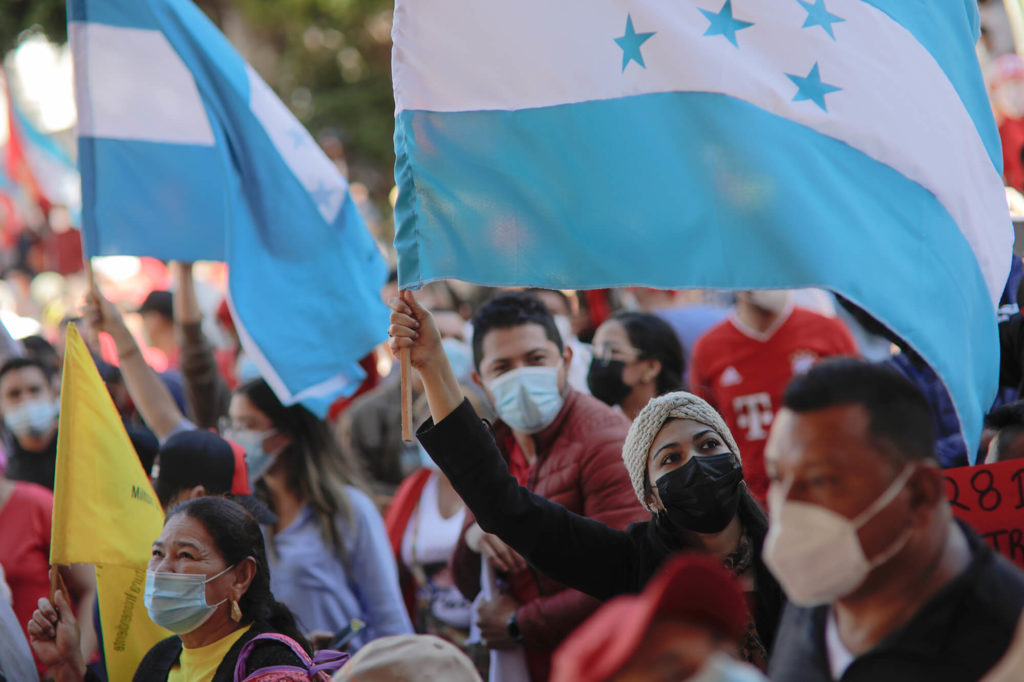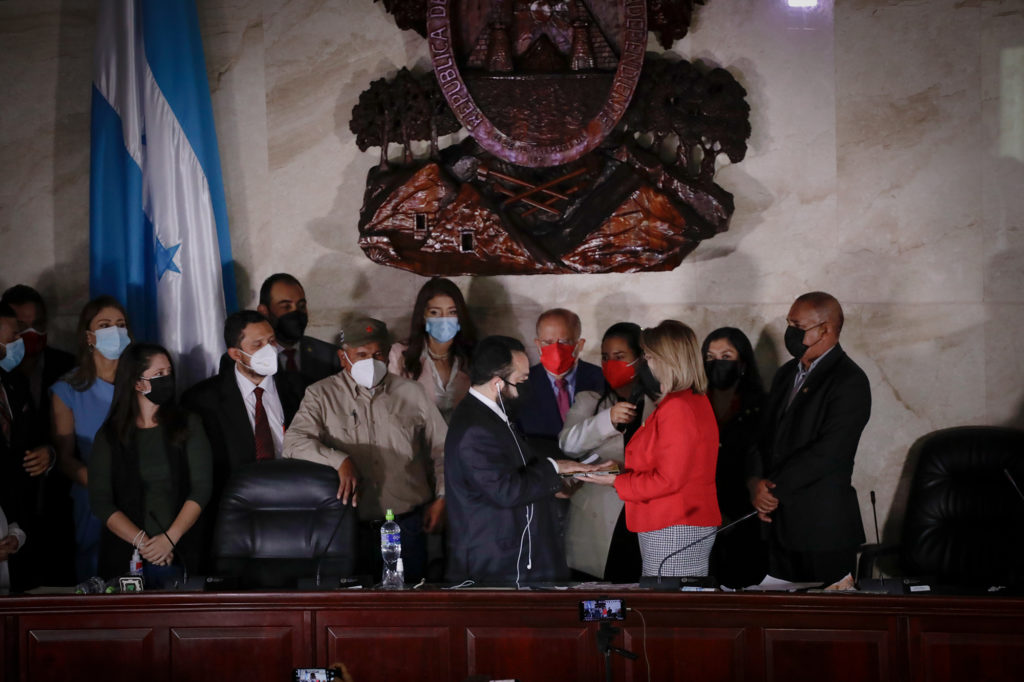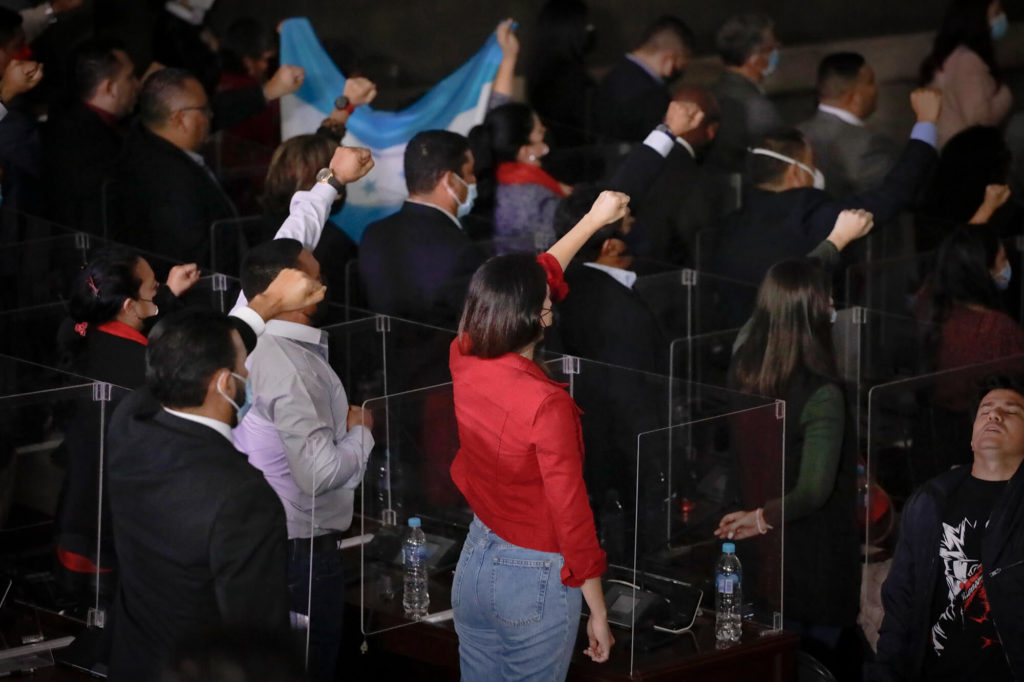Competing boards of directors of the National Congress were sworn in on January 23 in Honduras. One was elected by a group of 79 legislators who met offsite, 30 kilometers from the National Congress’s chambers. The other board was elected by 50 members of Congress who met in a legislative chamber with no lighting. Some political analysts say the first board was legally elected, but the second one is backed by president-elect Xiomara Castro. The dispute will now have to be sorted out by the nation’s constitutional court.
By Leonardo Aguilar,
with additional reporting from Fernando Silva and Vienna Herrera
Photos by Jorge Cabrera
In an unusual meeting held at the Bosques de Zambrano country club, more than 30 kilometers from its Tegucigalpa chambers, the National Congress of Honduras elected its new board of directors on January 23. Representative Jorge Cálix, recently expelled from the Liberty and Refoundation (Libre) Party, was elected to a four-year term as president of the National Congress.
The other members of the new board will serve two-year terms. The communications department of the National Congress released a brief statement that 79 legislators voted to elect the new board.
Apart from Jorge Cálix as the new congress president, Yahvé Sabillón will be vice president, and Beatriz Valle, the secretary. On January 21, all three were expelled from the Libre party by president-elect Xiomara Castro, who said that 18 of 50 Libre Party members of congress had been expelled for refusing to support their own party’s political alliance with the Alliance (Alianza) Party.
The National Congress was officially scheduled to convene for an in-person vote in the legislative chamber at 7:00 am on January 23. However, the meeting site was changed that morning to the Bosques de Zambrano country club because of personal security concerns.
A crowd later gathered at the National Congress to reject the board led by Jorge Cálix, who was accused of “high treason.” Castro told them, “The traitors must be stopped and the will of the people must be respected.”
Congressional proprietary board of directors
2022-2026
Junta Directiva en propiedad Congreso Nacional periodo 2022-2026. pic.twitter.com/8OSOdchiUF
— Congreso Nacional (@Congreso_HND) January 23, 2022
Meanwhile, another National Congress faction elected a different board of directors with Luis Redondo of the Salvation Party of Honduras (Partido Salvador de Honduras – PSH) as its president. Redondo is backed by the Libre Party leadership, who had committed to electing a PSH member as president of the National Congress, in exchange for the PSH’s support of Xiomara Castro in the November 2020 election.
Attorney Dennis Emilio Hércules believes that Jorge Cálix’s swearing-in as president of the National Congress complies with the constitution, but thinks the meeting to elect the new board was convened in an “undemocratic” manner.
In an interview with Contracorriente on the premises of the National Congress in Tegucigalpa, Ramón Enrique Barrios, a Libre Party member of congress and a law professor, said that two key factors should be taken into account. “First, there is political recognition of the legitimacy of the newly-elected president [Xiomara Castro],” said Barrios.
“Secondly, the law establishes that when there is a conflict between two branches of government, the Constitutional Court must intervene to resolve the matter. The election [of Luis Redondo as president of the National Congress] is completely legal because we were convened in the Legislative Chamber, and that’s the location established in the constitution for the election of the board of directors.”
Barrios said, “We were notified at 8:00 am to travel to the Bosques de Zambrano country club, which was practically impossible. Therefore, the convening of that meeting was illegal. The constitution states that in the absence of a Provisional Board of Directors, only five members of congress are needed to decide on holding such an election.”
Reflecting on the polarized environment, Barrios said in a sombre tone, “As politicians, we have to apologize to the Honduran people because they came out to vote in huge numbers, and they want these conflicts to be resolved in a democratic manner.”
During the early morning meeting that elected Luis Redondo, there was no power in the Legislative Chamber of the National Congress, and the participants used their cell phones for light. Redondo was sworn in by Rassel Tomé, a Libre Party member of Congress who physically assaulted Jorge Calix and Beatriz Valle two days before the swearing-in of the National Congress Provisional Board.
Consequences
In an interview with Contracorriente, attorney Omar Menjívar, the vice-mayor of San Pedro Sula and a Libre Party member, said, “There is no congress right now. We have a broken institution ─ one of the pieces stands on shaky legal ground, while the other stands on impressively legitimate ground. A healthy democracy depends on the legitimacy that the majority instills in its institutions.”
On the cusp of her inauguration, Xiomara Castro has publicly stated that she will refuse to be sworn in by Jorge Cálix, and will instead take her oath of office before a judge, an option provided by the constitution. Cálix told the press that he denies any intention to stage a coup against the presidency if there is no consensus on who will administer the oath of office.
The members of congress who supported Redondo claim to have 96 votes supporting his presidency; a number that includes alternate members who did not attend the meeting. However, Libre Party activists who are not members of congress were observed raising their hands to cast votes for the new board of directors. The official roster of the legislators that voted in this election has not yet been made public. Hugo Noé Pino, who was elected to serve as Redondo’s vice-president, says that if any Libre Party supporters who are not members of congress did vote in the election, then that was simply a mistake and not something that the Libre Party orchestrated.
Liberal Party congressperson José Alfredo Saavedra told Contracorriente that although he didn’t know whether ineligible votes were cast in the election, “it’s a bad practice that has occurred in the past, and if it happened again, it’s still a bad practice.” Saavedra said this crisis should never have happened because the Honduran public did its job with its massive election turnout, and that the country’s political factions must now do their part and find common ground.
Saavedra noted that a possible solution was to engage in dialogue and resolve the conflict. He said, “It’s a political issue that can be resolved through political agreements that will oblige political factions to compromise. I hope this happens before the president’s inauguration on January 27.”

As various foreign leaders head to Honduras for Castro’s inauguration, Congressperson Jari Dixon said that the recent problems would not affect the event. He noted that conflict happens everywhere, so it’s expected in Honduras as well.
Dixon pointed to the Trump supporters that attacked the U.S. Capitol in January 2021 and said, “When Donald Trump refused to relinquish power, people marched to the U.S. Capitol. That’s the way it is ─ there’s conflict in every country. Name a country that doesn’t and that’s when I’ll start to worry. We are resolving our own problems and on January 27, we will begin our nation’s normal governance process. Every member of congress is invited to come and then get to work because the legislature will be in session.”
For the first time in the nation’s political history, a large crowd that had been waiting outside took over the Legislative Chamber after Redondo ended the congress’ session. Foreign embassies and diplomatic delegations in Honduras have yet to recognize either of the two legislators who claim to be the legal and legitimate president of the National Congress.







